Refrigeration Cycle
13 Key Steps to Optimize Heat Pump Performance

Having trouble maximizing your heat pump’s efficiency? We get how annoying that can be. That’s why we’ve put together 13 essential steps to enhance its functionality.
From understanding the refrigeration cycle to choosing the right refrigerant, we’ve got you covered. With proper sizing, installation, and maintenance, you can ensure efficient heat exchange and prevent potential air leaks.
Plus, we’ll show you how to maximize performance in different climate zones and utilize energy-saving features. Let us help you serve your heat pump better.
Key Takeaways
- Understand the refrigeration cycle and choose the right refrigerant for efficient heat exchange and low environmental impact.
- Ensure proper sizing and installation of heat pump equipment to maximize efficiency and effectiveness.
- Maintain adequate airflow and clean heat exchange surfaces regularly for optimal heat transfer.
- Optimize compressor performance, utilize advanced technologies, and implement effective control strategies to enhance heat pump performance.
Understanding the Refrigeration Cycle in Heat Pumps
Let’s delve into the intricacies of the refrigeration cycle in heat pumps to gain a comprehensive understanding of its operation. The refrigeration cycle is a vital component of heat pump systems, responsible for transferring heat from one place to another. It consists of four main stages: compression, condensation, expansion, and evaporation.

During the compression stage, the refrigerant is compressed, causing its temperature and pressure to rise. This high-pressure, high-temperature gas then flows into the condenser, where it releases heat and condenses into a liquid. The liquid refrigerant then enters the expansion valve, where it undergoes a pressure drop, resulting in a decrease in temperature. This cool liquid then enters the evaporator, where it absorbs heat from the surrounding environment and evaporates into a gas.
Understanding the refrigeration cycle is crucial for troubleshooting any issues that may arise in heat pump systems. By identifying potential problems in the compression, condensation, expansion, or evaporation stages, technicians can address them promptly to ensure optimal heat pump energy efficiency.
Now that we’ve a solid understanding of the refrigeration cycle in heat pumps, let’s move on to the next section, which focuses on choosing the right refrigerant for optimal performance.
Choosing the Right Refrigerant for Optimal Performance
To achieve optimal performance, we must carefully select the right refrigerant for our heat pump system. The choice of refrigerant plays a critical role in determining the efficiency and overall performance of the heat pump.
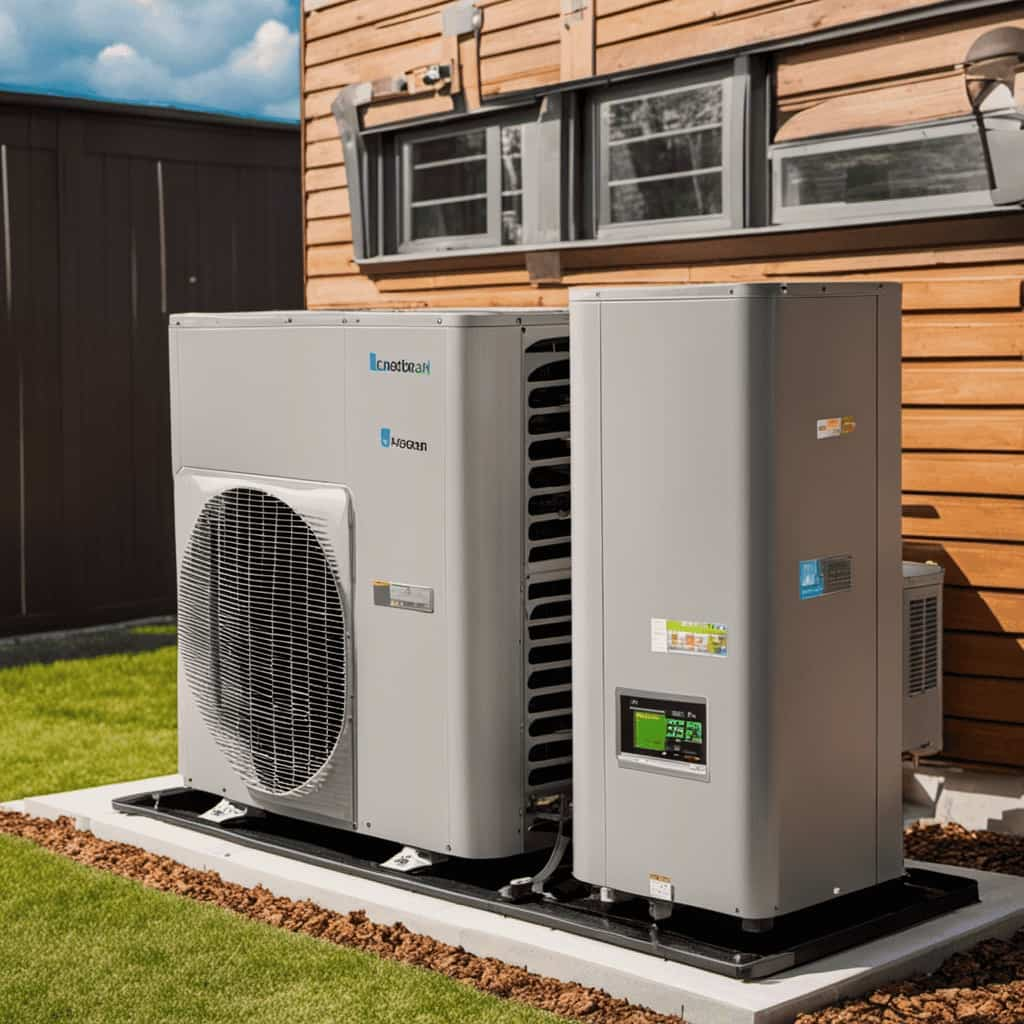
When considering refrigerant options, it’s important to take into account several performance factors:
-
Heat Transfer Efficiency:
-
The refrigerant should have a high heat transfer coefficient to ensure efficient heat exchange between the indoor and outdoor environments.
-
It should also have a low boiling point and high latent heat of vaporization to facilitate the heat transfer process.

-
Environmental Impact:
-
We must consider refrigerants with low global warming potential (GWP) and ozone depletion potential (ODP) to minimize their impact on the environment.
Proper Sizing and Installation of Heat Pump Equipment
When it comes to heat pump equipment, proper sizing and installation are crucial for optimal performance.
Correct sizing ensures that the heat pump is able to meet the heating and cooling demands of the space, while expert installation guarantees that the equipment operates efficiently and effectively.

Errors in sizing or installation can have a significant impact on the heat pump’s efficiency, leading to higher energy consumption and reduced comfort levels.
Importance of Correct Sizing
As we delve into the importance of correct sizing for heat pump equipment, it’s crucial to ensure proper installation and sizing to optimize performance.
Correct sizing benefits both the equipment and the occupants of a building in several ways:
-
Efficient operation: Properly sized heat pump equipment ensures that the system operates at its optimal capacity, resulting in improved energy efficiency and reduced utility costs.

-
Comfortable indoor environment: Sizing considerations include the specific heating and cooling needs of a space. By selecting the right size, the heat pump can effectively maintain a comfortable temperature throughout the building.
-
Avoiding frequent cycling: Oversized equipment can lead to frequent on-off cycling, causing temperature fluctuations and discomfort.
-
Preventing inadequate heating or cooling: Undersized equipment may struggle to meet the demand, resulting in poor performance and inadequate temperature control.
Expert Installation Benefits
For optimal performance, we must ensure the proper sizing and installation of heat pump equipment. Expert installation benefits play a crucial role in maximizing the efficiency and effectiveness of these energy-saving technologies.
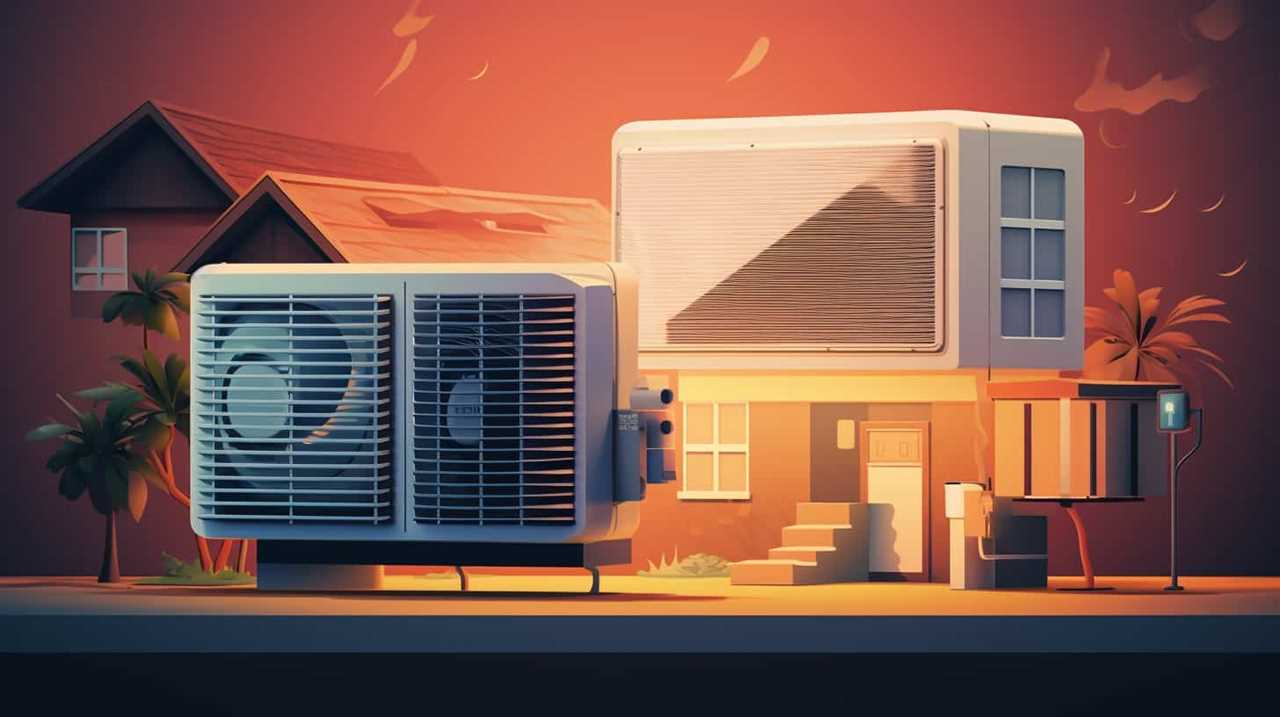
When it comes to heat pump installation, relying on professionals ensures that the equipment is sized correctly for your specific needs. This means that the heat pump will be able to provide the desired heating or cooling capacity without wasting energy.
Expert installers are also knowledgeable about the latest energy-saving technologies and can recommend the most efficient equipment for your home or business.
Additionally, proper installation ensures that all components are connected correctly and that the system operates at its highest efficiency.
Efficiency Impact of Errors
Proper sizing and installation of heat pump equipment significantly impact the efficiency of the system. Reducing errors in these areas is crucial for optimizing performance.
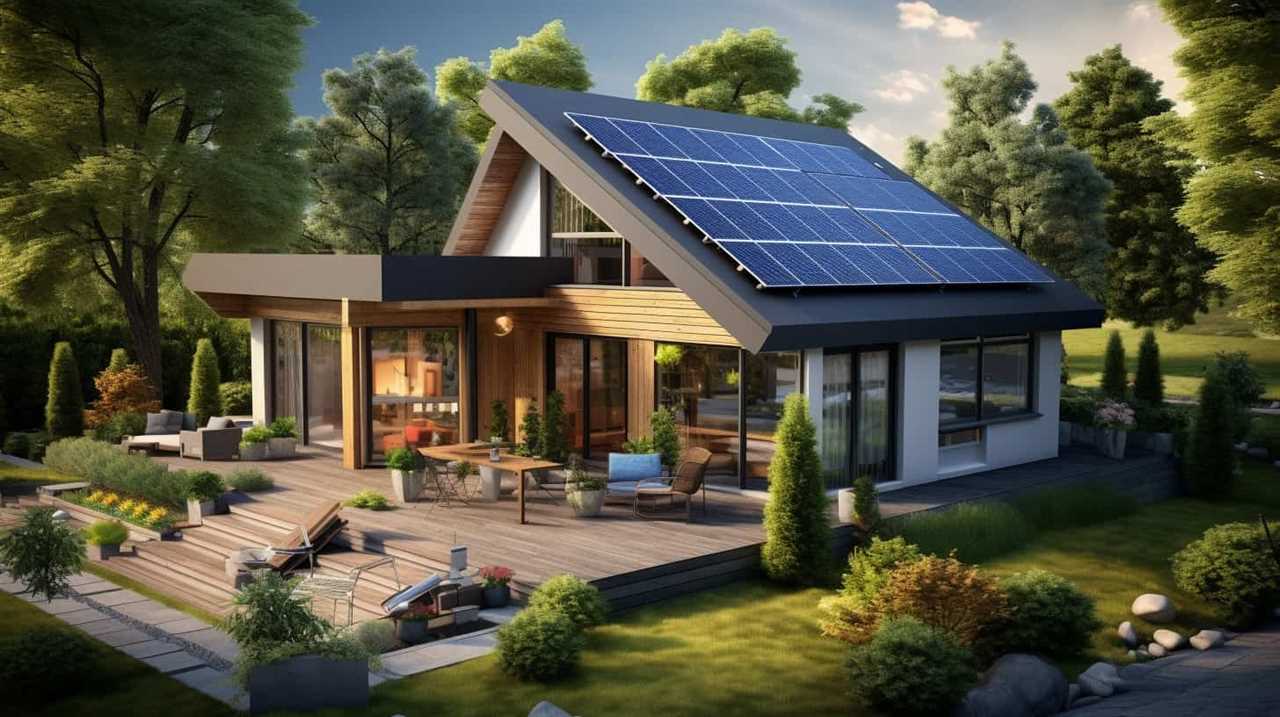
Here are two key ways in which errors can have a performance impact:
-
Sizing Errors: Incorrectly sizing the heat pump can lead to inefficiencies. If the unit is oversized, it may cycle on and off frequently, wasting energy. Conversely, an undersized unit may struggle to meet the heating or cooling demand, resulting in poor comfort and increased energy consumption.
-
Installation Errors: Improper installation can also undermine the heat pump’s efficiency. Common installation errors include inadequate insulation, improper refrigerant charge, and poor ductwork design. These errors can lead to energy losses, reduced performance, and increased wear and tear on the system.
Ensuring proper sizing and installation is essential for maximizing efficiency and minimizing energy consumption. However, it’s equally important to ensure adequate airflow in the heat pump system, which we’ll discuss in the next section.

Ensuring Adequate Airflow in the Heat Pump System
We need to ensure that there’s adequate airflow in the heat pump system to optimize its performance. Proper ventilation is crucial for the efficient operation of the heat pump. Insufficient airflow can lead to decreased efficiency, reduced heating or cooling capacity, and increased energy consumption.
To ensure proper ventilation, it’s important to regularly clean or replace air filters. Clogged filters restrict airflow and force the heat pump to work harder, reducing its efficiency. Additionally, make sure that there are no obstructions around the outdoor unit, such as vegetation or debris, as this can impede airflow.
Regular maintenance and inspections by a qualified technician can help identify and address any airflow issues in the heat pump system, ensuring optimal performance and energy savings.
Maintaining Clean and Efficient Heat Exchange Surfaces
We regularly clean the heat exchange surfaces to ensure they remain clean and efficient. Maintaining the cleanliness of heat exchange surfaces is crucial for optimal heat pump performance and energy efficiency. Here are the key steps we follow for heat exchanger maintenance:

-
Visual inspection: We visually inspect the heat exchange surfaces regularly to identify any signs of dirt, debris, or corrosion.
-
Cleaning: If we observe any buildup of dirt or debris, we clean the surfaces using appropriate cleaning solutions and tools to remove any contaminants.
-
Mechanical cleaning: For stubborn deposits, we use brushes or pressure washing to dislodge and remove them.
-
Chemical cleaning: In some cases, we may utilize specialized chemical cleaners to dissolve and remove stubborn deposits.
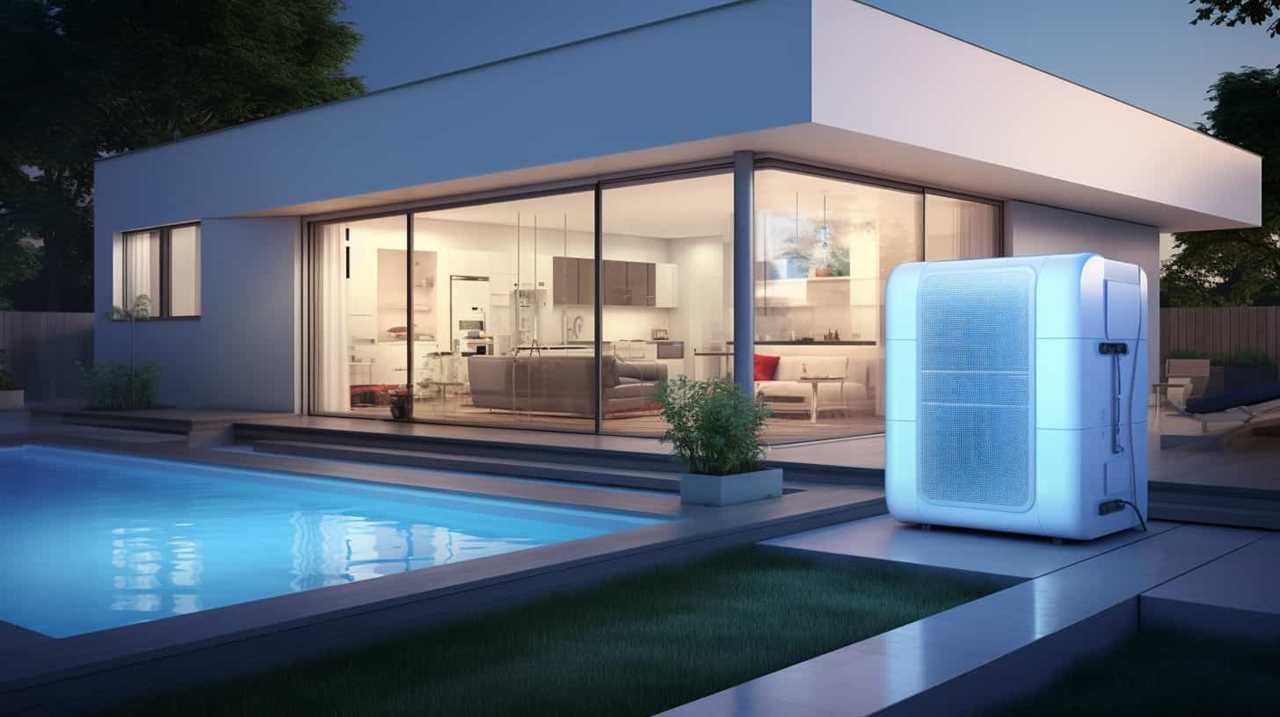
By regularly cleaning the heat exchange surfaces, we ensure efficient heat transfer, maximize energy efficiency, and prevent any potential issues that may arise due to clogged or inefficient heat exchangers.
Now, let’s discuss the next step in optimizing heat pump performance: optimizing the compressor performance for better efficiency.
Optimizing the Compressor Performance for Better Efficiency
When it comes to optimizing the performance of a heat pump, one crucial aspect to consider is the efficiency of the compressor. By enhancing the compressor performance, we can significantly improve the overall efficiency of the heat pump system.
This involves implementing strategies such as selecting the right compressor size, maintaining proper refrigerant charge, and regularly servicing the compressor to ensure optimal operation.

Compressor Efficiency and Optimization
To achieve better efficiency, we should focus on optimizing the performance of the compressor. The compressor is a critical component of a heat pump system and plays a crucial role in maintaining the desired temperature.
Here are key steps to optimize compressor efficiency:
-
Compressor Maintenance:
-
Regularly clean the compressor to remove dust and debris, ensuring efficient airflow.

-
Check and replace worn-out components, such as valves and seals, to prevent leaks and maintain optimal performance.
-
Energy Consumption:
-
Monitor and adjust the heat pump’s operating parameters, such as temperature and pressure, to minimize energy consumption.
-
Consider installing a variable speed drive (VSD) compressor, which adjusts its speed based on the required load, resulting in better energy efficiency.
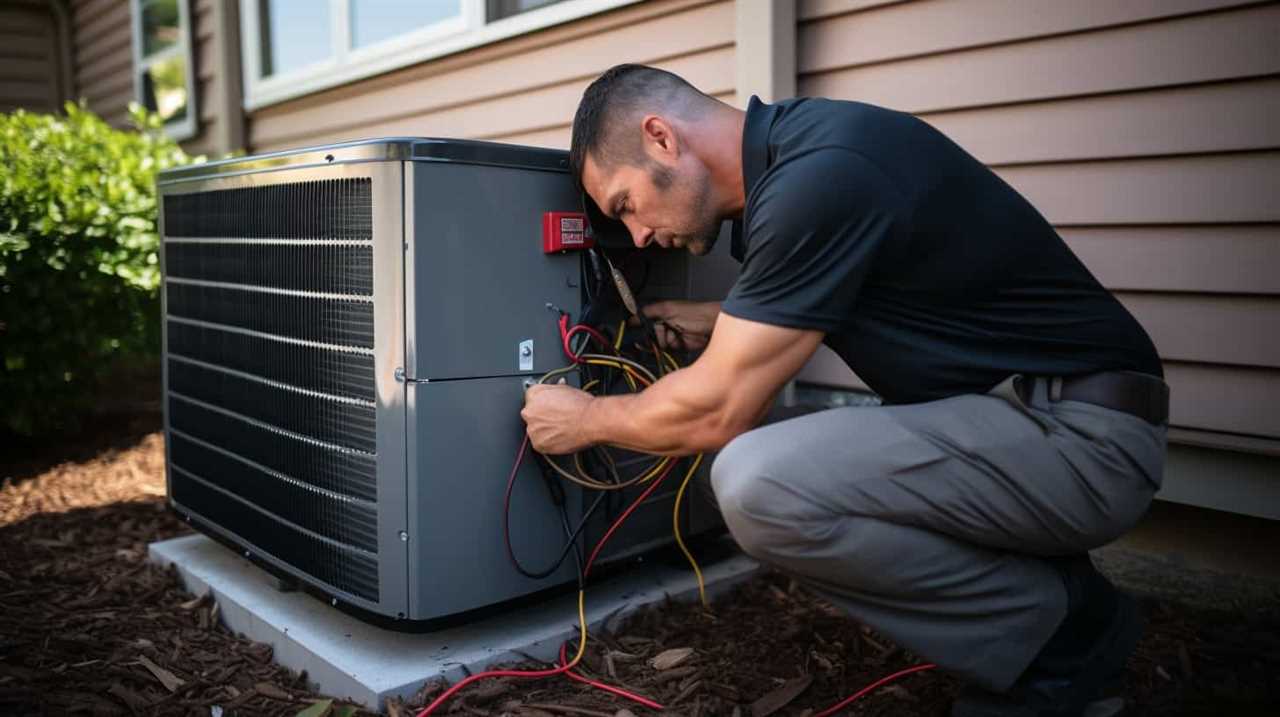
Optimizing the compressor’s performance through proper maintenance and energy management can lead to significant improvements in overall heat pump efficiency. By implementing these steps, you can ensure that your heat pump operates at its best, providing comfort while minimizing energy consumption.
Enhancing Heat Pump Performance
By optimizing the compressor performance, we can enhance the efficiency of the heat pump. Maximizing efficiency is crucial in order to reduce energy consumption and lower operating costs.
One way to improve heat transfer and maximize efficiency is by ensuring that the compressor is properly sized for the heat pump system. An undersized compressor can result in poor heat transfer and reduced performance, while an oversized compressor can lead to excessive energy consumption.
Additionally, using advanced compressor technologies, such as variable speed compressors, can further improve efficiency by matching the compressor’s output to the heat load requirements.
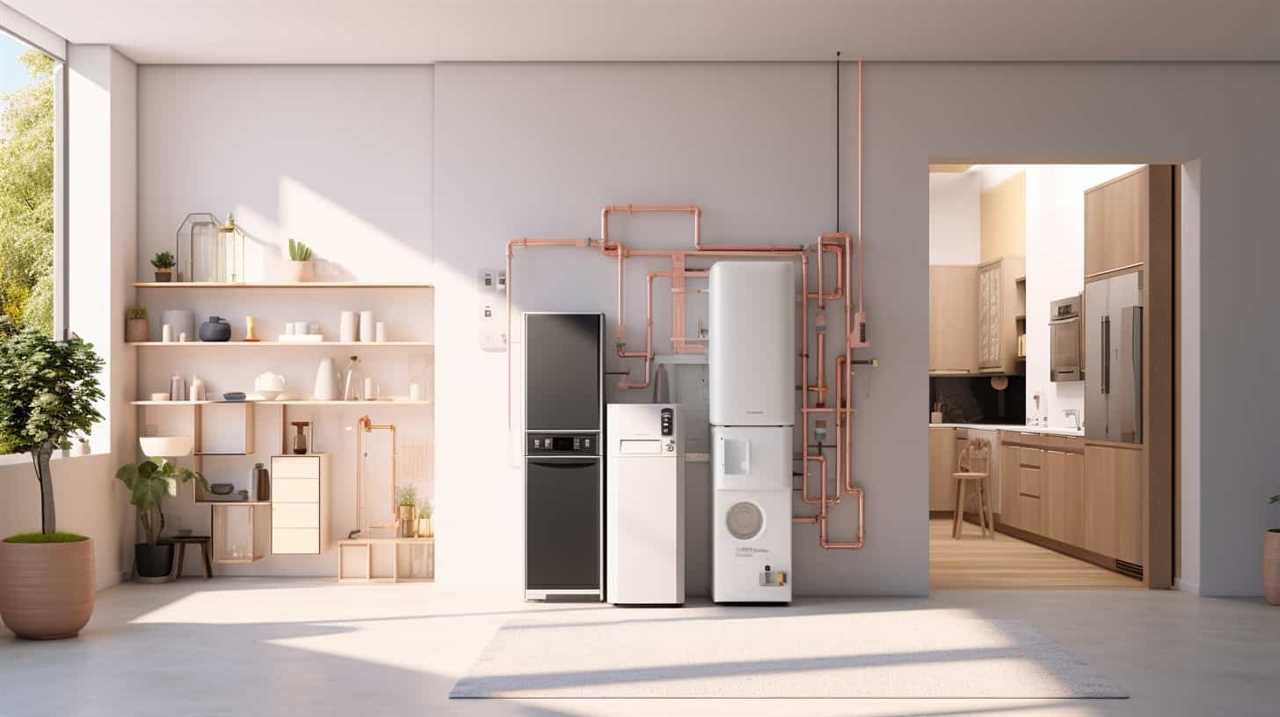
Implementing effective heat pump control strategies is the next step in optimizing heat pump performance, which we’ll discuss in the following section.
Now, let’s transition into the subsequent section about ‘implementing effective heat pump control strategies’.
Implementing Effective Heat Pump Control Strategies
As we delve into the topic of implementing effective heat pump control strategies, it’s important to consider the various factors that can optimize performance. By improving efficiency and utilizing smart controls, we can ensure that heat pumps operate at their highest potential.
Here are two key strategies to implement:
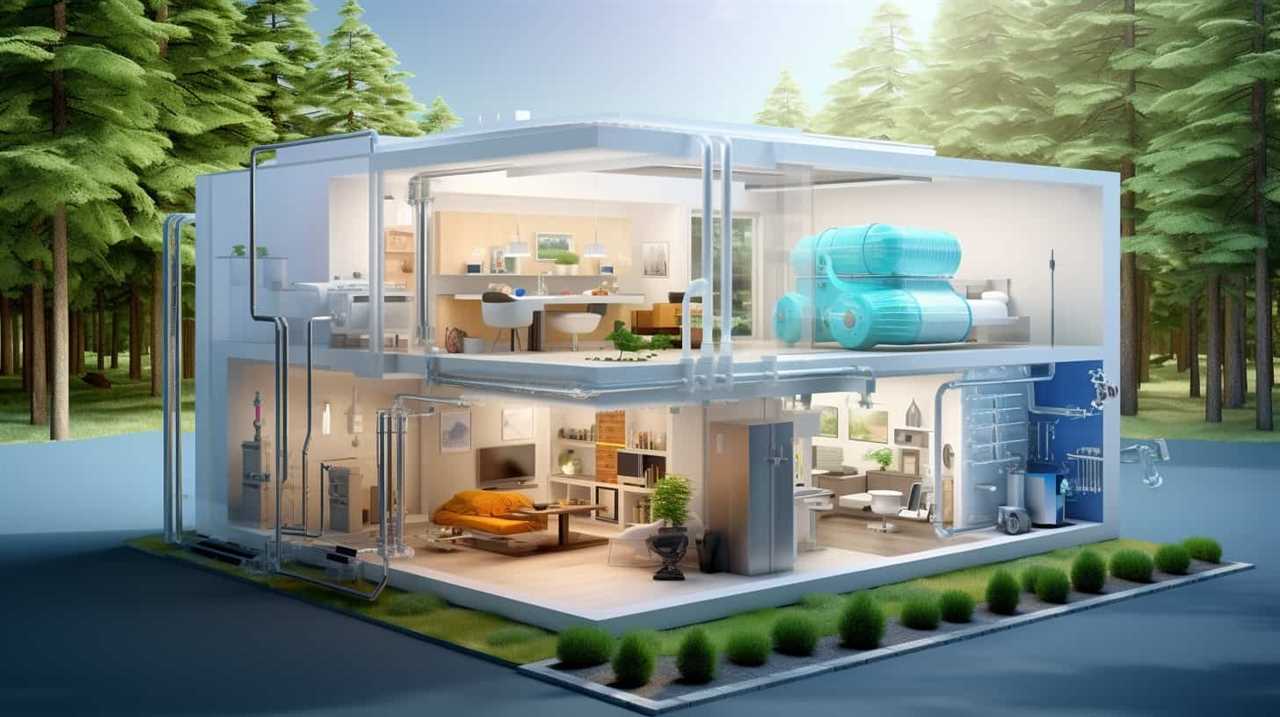
-
Utilize advanced control algorithms: Smart controls can continuously monitor and adjust the heat pump’s operation based on factors such as outdoor temperature, indoor occupancy, and energy demand. By dynamically optimizing settings, these algorithms ensure that the heat pump operates at its most efficient level at all times.
-
Incorporate variable speed technology: By utilizing variable speed compressors and fans, heat pumps can adjust their output to match the heating or cooling demand. This enables precise temperature control and minimizes energy wastage. Additionally, variable speed technology reduces start-stop cycles, resulting in less wear and tear on the system.
Implementing these effective control strategies won’t only improve efficiency but also enhance the overall performance of heat pumps, providing optimal comfort and energy savings for users.
Regularly Monitoring and Adjusting Refrigerant Charge
We must regularly monitor and adjust the refrigerant charge to ensure optimal heat pump performance. The refrigerant charge in a heat pump plays a crucial role in its overall efficiency and ability to transfer heat effectively. Keeping the refrigerant charge at the manufacturer’s specified levels is essential for maximizing energy efficiency and preventing system malfunctions.
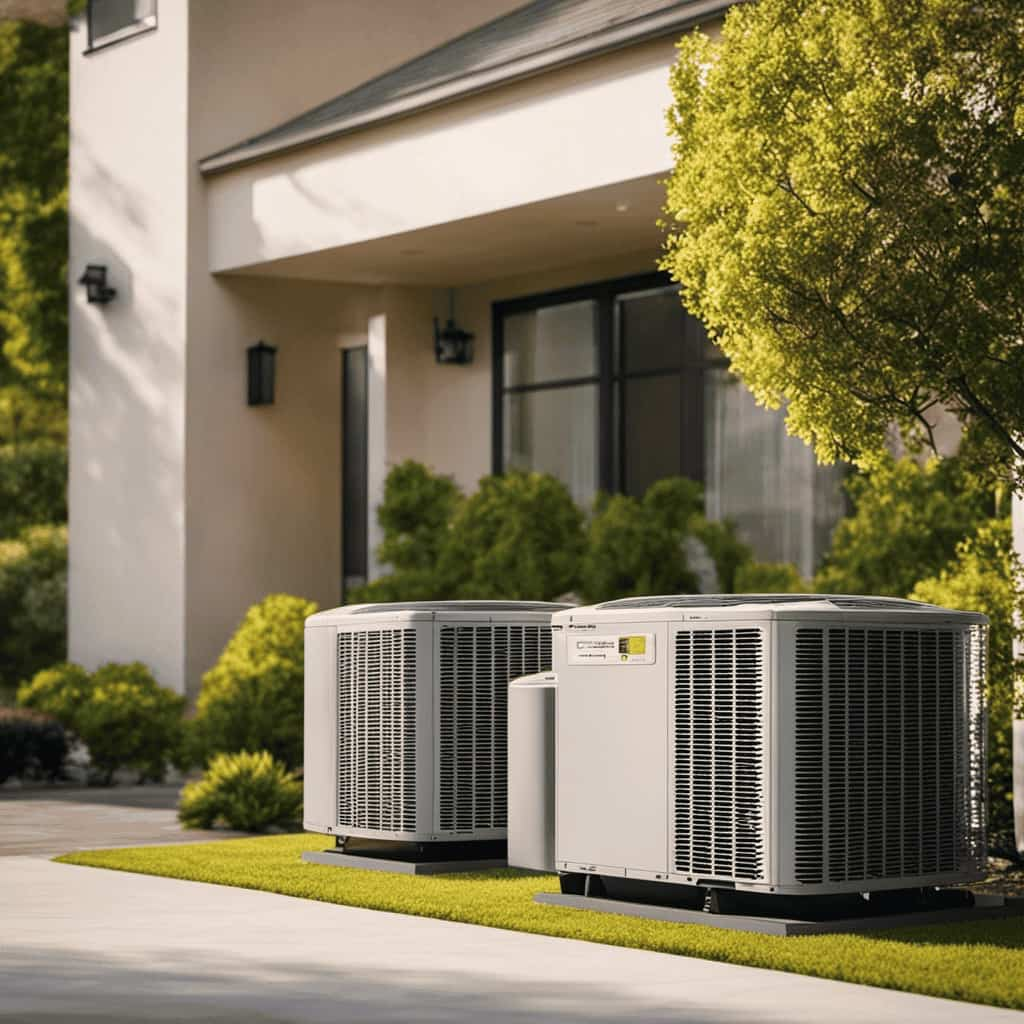
To optimize the refrigerant charge, various monitoring techniques can be employed. These include measuring the superheat and subcooling values, which indicate the amount of refrigerant in the system. By comparing these values with the recommended ranges, adjustments can be made to achieve optimal performance.
Additionally, using advanced monitoring tools such as digital gauges and pressure sensors can provide real-time data on the refrigerant charge, allowing for quick adjustments and preventing potential issues.
Regularly monitoring and adjusting the refrigerant charge is a key step in maintaining the efficiency and longevity of a heat pump system.
Properly Insulating the Refrigerant Lines to Minimize Heat Loss
To minimize heat loss, we should properly insulate the refrigerant lines. This step is crucial in preventing energy waste and maximizing the efficiency of the heat pump system. Here are two important reasons why proper insulation is necessary:

-
Preventing heat transfer: Insulating the refrigerant lines helps to minimize heat loss during the transportation of refrigerant between the indoor and outdoor units. By reducing heat transfer, we can ensure that the refrigerant reaches its destination at the desired temperature, improving the overall performance of the heat pump.
-
Maintaining system efficiency: Insulation also helps to prevent condensation and moisture buildup on the refrigerant lines. This is important because moisture can lead to corrosion and damage to the system components, ultimately reducing the efficiency and lifespan of the heat pump.
Addressing Potential Air Leaks in the Heat Pump System
Let’s start by discussing the first point, which is detecting hidden air leaks in the heat pump system.
Air leaks can significantly impact the efficiency and performance of the system, leading to increased energy consumption and decreased comfort levels. By conducting a thorough inspection, using tools like smoke pens or infrared cameras, we can identify and locate any air leaks that may be present.

Once the leaks are detected, the next step is to seal the ductwork to maximize efficiency. Properly sealed ductwork ensures that the heated or cooled air is delivered directly to the intended areas, minimizing energy waste.
Regular maintenance is also crucial to address any potential air leaks that may develop over time, as well as to ensure the overall performance and longevity of the heat pump system.
Detecting Hidden Air Leaks
Our first step in addressing potential air leaks in the heat pump system is to detect hidden air leaks. Detecting airflow issues and troubleshooting common heat pump problems is crucial to ensure optimal heat pump performance.
Here are the key steps to detect hidden air leaks and address potential air leaks in the heat pump system:
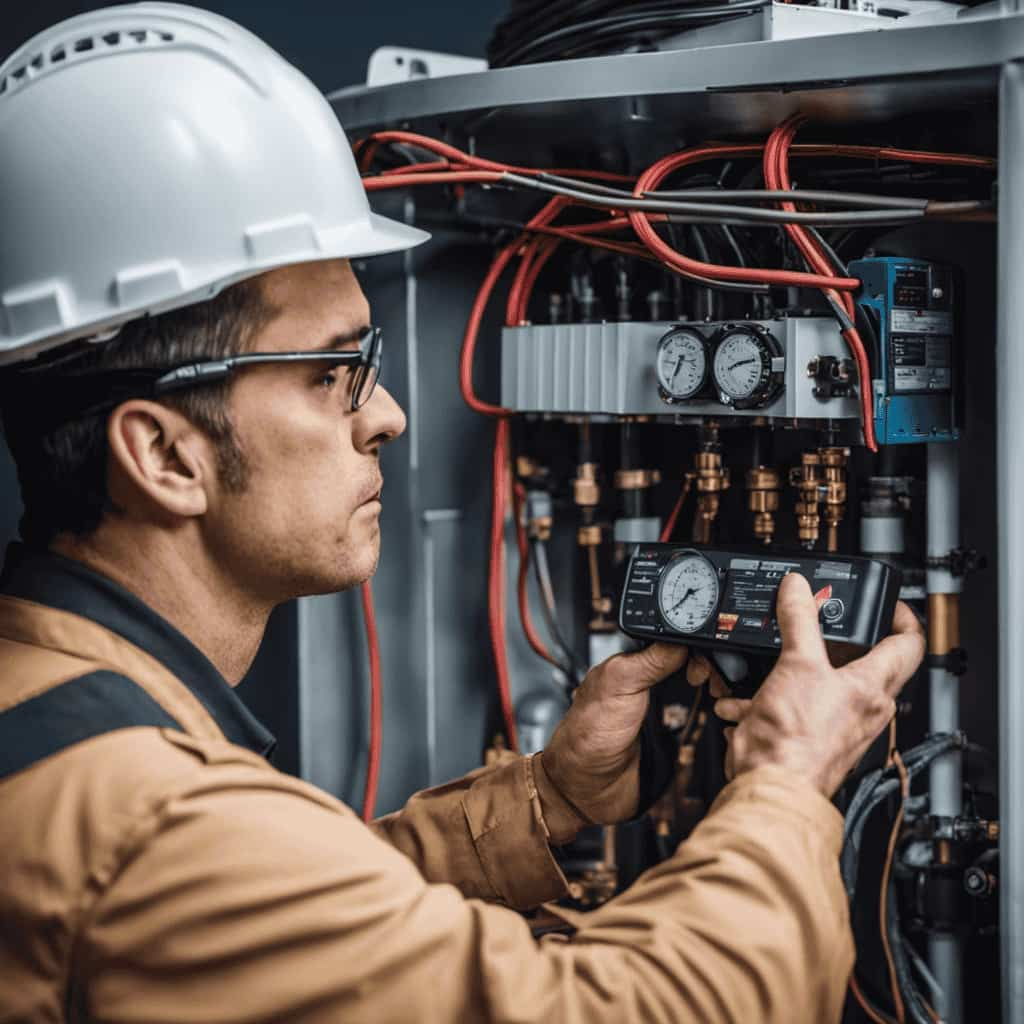
-
Visual inspection:
-
Check for any visible gaps or cracks in the heat pump unit or ductwork.
-
Look for signs of condensation or moisture around the unit, which can indicate air leaks.
-
Airflow testing:

-
Conduct a blower door test to measure the amount of air leakage in the system.
-
Use a smoke pencil or infrared camera to identify air leaks by observing the movement of smoke or temperature differences.
Sealing Ductwork for Efficiency
We can improve heat pump efficiency by sealing ductwork and addressing potential air leaks in the system. Properly sealed ductwork ensures that the conditioned air reaches its intended destination without any loss. One way to achieve this is through ductwork insulation, which helps maintain the desired temperature by minimizing heat transfer.
Insulating ductwork prevents energy losses and reduces the workload of the heat pump, resulting in improved efficiency. Additionally, an energy efficient duct design plays a crucial role in optimizing heat pump performance. This involves proper sizing, layout, and configuration of the duct system to minimize air leaks and pressure imbalances.

Importance of Regular Maintenance
To ensure optimal performance of the heat pump system, it’s important to regularly address potential air leaks. Regular maintenance is crucial for the efficient operation of the heat pump and can provide numerous benefits.
Here are two key reasons why addressing potential air leaks through regular maintenance is essential:
-
Improved Energy Efficiency: By sealing any air leaks in the heat pump system, you can prevent the loss of conditioned air. This ensures that the heat pump operates at its maximum efficiency, reducing energy consumption and saving you money on utility bills.
-
Enhanced Indoor Comfort: Addressing air leaks helps maintain a consistent temperature throughout your home. By preventing drafts and hot or cold spots, you can create a more comfortable living environment for yourself and your family.
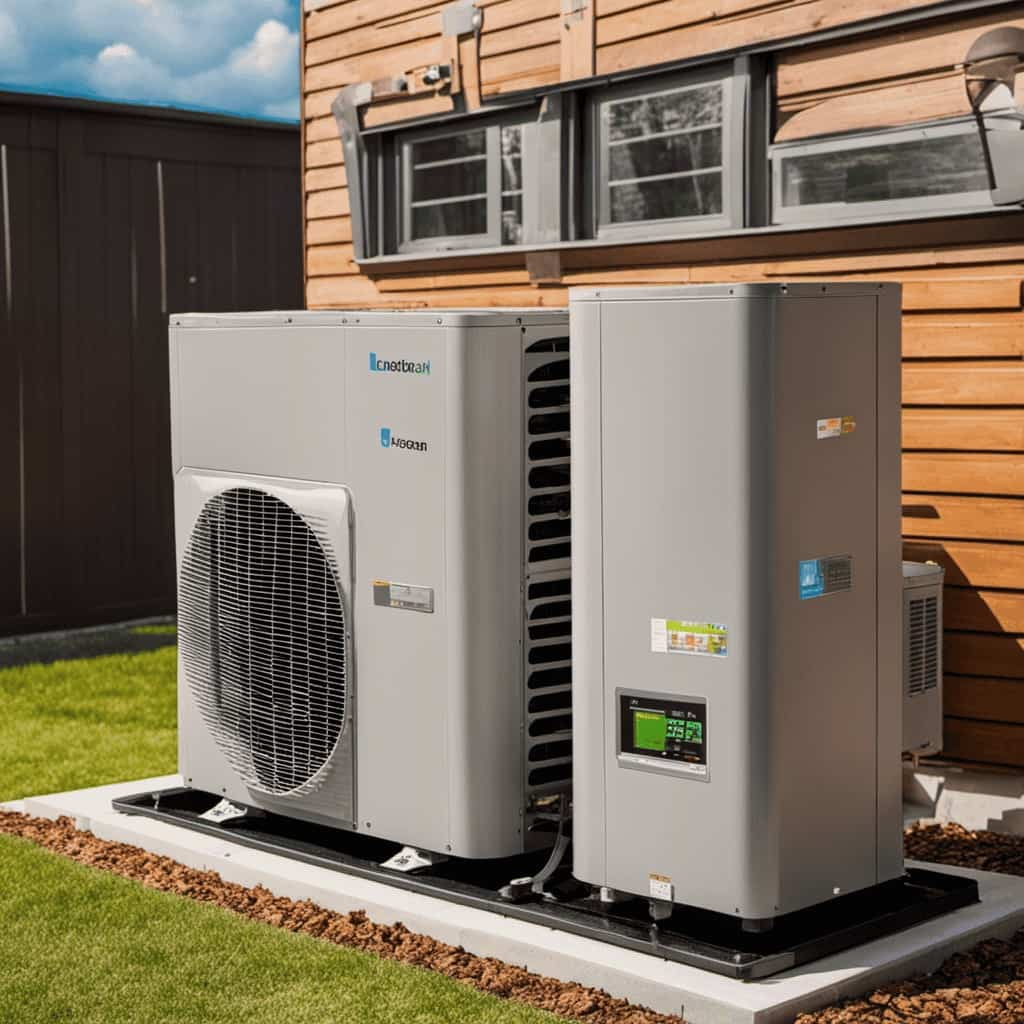
To enjoy these benefits, it’s recommended to follow a regular maintenance schedule and have a professional technician inspect and seal any potential air leaks in your heat pump system.
Maintenance and Cleaning of Heat Pump Coils and Filters
Regular maintenance and cleaning of heat pump coils and filters is essential for optimal performance. Neglecting these tasks can lead to reduced efficiency, increased energy consumption, and even system breakdowns. To ensure the longevity and efficiency of your heat pump, it is important to follow proper maintenance techniques and troubleshooting tips. Here are some key steps to help you maintain and clean your heat pump coils and filters:
| Maintenance Techniques | Troubleshooting Tips |
|---|---|
| Regularly clean the coils and filters to remove dirt, debris, and dust. | If the heat pump is not producing enough heat or cool air, check the coils and filters for clogs or blockages. |
| Inspect the coils for any signs of damage or corrosion. | If the heat pump is making unusual noises, it could indicate a problem with the coils or filters. |
| Replace or repair any damaged coils or filters as soon as possible. | If the heat pump is constantly cycling on and off, it may be due to a dirty or clogged filter. |
| Schedule professional maintenance at least once a year to ensure proper functioning. | If the heat pump is not turning on at all, check the coils and filters for any issues. |
Optimizing Heat Pump Performance in Different Climate Zones
In order to optimize heat pump performance in different climate zones, it’s important to adjust settings and settings and settings and settings and settings and settings and settings and settings and settings and settings and settings and settings. This adjustment is crucial due to the climate change impact, which affects the way heat pumps operate.
To serve our audience effectively, we need to provide detailed information on optimizing heat pump performance in different climate zones. Here are two key considerations:

- Climate Analysis:
- Conduct an energy consumption analysis to determine the specific climate conditions in the area.
- Consider factors such as temperature range, humidity levels, and seasonal variations.
- System Settings:
- Adjust the thermostat settings to match the climate zone, ensuring efficient operation.
- Fine-tune the defrost cycle to prevent unnecessary energy consumption during colder climates.
Utilizing Energy-Saving Features and Technologies in Heat Pumps
By implementing energy-saving features and technologies, we can enhance the performance of heat pumps. Energy-saving features are designed to reduce energy consumption and optimize the efficiency of heat pumps. One such feature is variable-speed technology, which allows the heat pump to adjust its speed according to the heating or cooling demand. This not only reduces energy waste but also improves comfort by providing more precise temperature control.
Another energy-saving feature is smart thermostats, which enable users to program their heat pumps for optimal efficiency. These thermostats can learn the user’s preferences and adjust the temperature accordingly, saving energy when the space is unoccupied.
Additionally, heat pump technologies such as geothermal heat pumps and air-source heat pumps utilize renewable energy sources, further reducing energy consumption and environmental impact. Incorporating these energy-saving features and technologies into heat pumps can significantly improve their performance and efficiency.
Frequently Asked Questions
What Are the Benefits of Regularly Monitoring and Adjusting Refrigerant Charge in a Heat Pump System?
The benefits of regular monitoring and adjusting refrigerant charge in a heat pump system can be summarized as improved energy efficiency, reduced costs, extended equipment lifespan, and enhanced comfort levels.

How Can Proper Insulation of Refrigerant Lines Minimize Heat Loss in a Heat Pump System?
Proper insulation of refrigerant lines is crucial in minimizing heat loss in a heat pump system. It ensures efficient heat transfer and prevents energy waste. Insulation acts as a protective barrier, keeping the refrigerant lines insulated and reducing heat loss.
What Are Some Effective Heat Pump Control Strategies That Can Be Implemented to Optimize Performance?
Heat pump control techniques are crucial for optimizing performance. Regular maintenance ensures optimal efficiency and prevents issues that can affect performance. We’ll discuss effective strategies and the importance of maintenance for heat pump performance.
How Do Different Climate Zones Affect the Optimization of Heat Pump Performance?
Different climate zones have varying effects on heat pump performance. Factors such as temperature, humidity, and air quality can impact the efficiency and effectiveness of different heat pump models. Proper optimization is crucial for optimal performance.
What Are Some Energy-Saving Features and Technologies That Can Be Utilized in Heat Pumps to Improve Efficiency?
To improve heat pump efficiency, energy efficient compressors and smart thermostats can be utilized. These features and technologies help optimize performance and save energy, making our heat pumps more efficient and cost-effective.

Conclusion
Well, congratulations! You’ve made it through all 13 key steps to optimize heat pump performance.
Now, armed with this wealth of knowledge, you can confidently navigate the complex world of heat pumps.
Remember, it’s all about understanding the refrigeration cycle, choosing the right refrigerant, proper sizing and installation, and addressing potential issues.
So go forth and conquer the heat pump world, my friends, and may your efficiency be ever optimized.
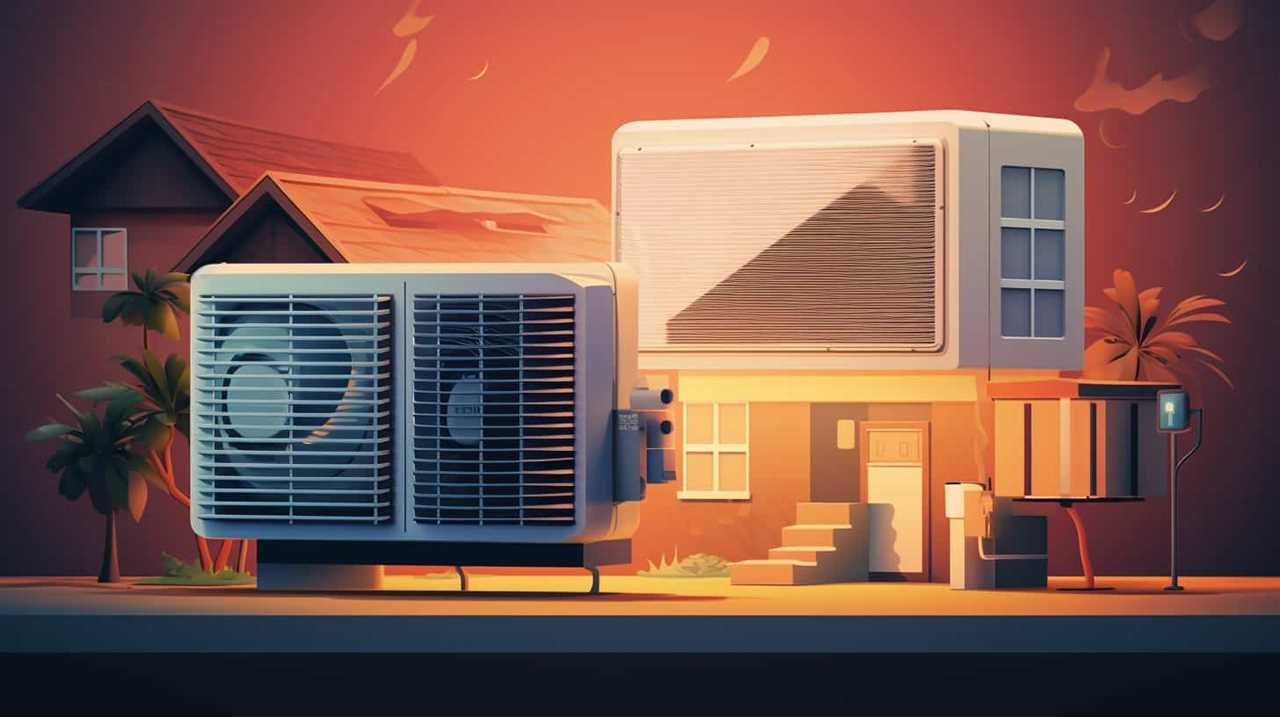
Refrigeration Cycle
High-Efficiency HVAC Systems: Heat Pump Breakthroughs Revealed
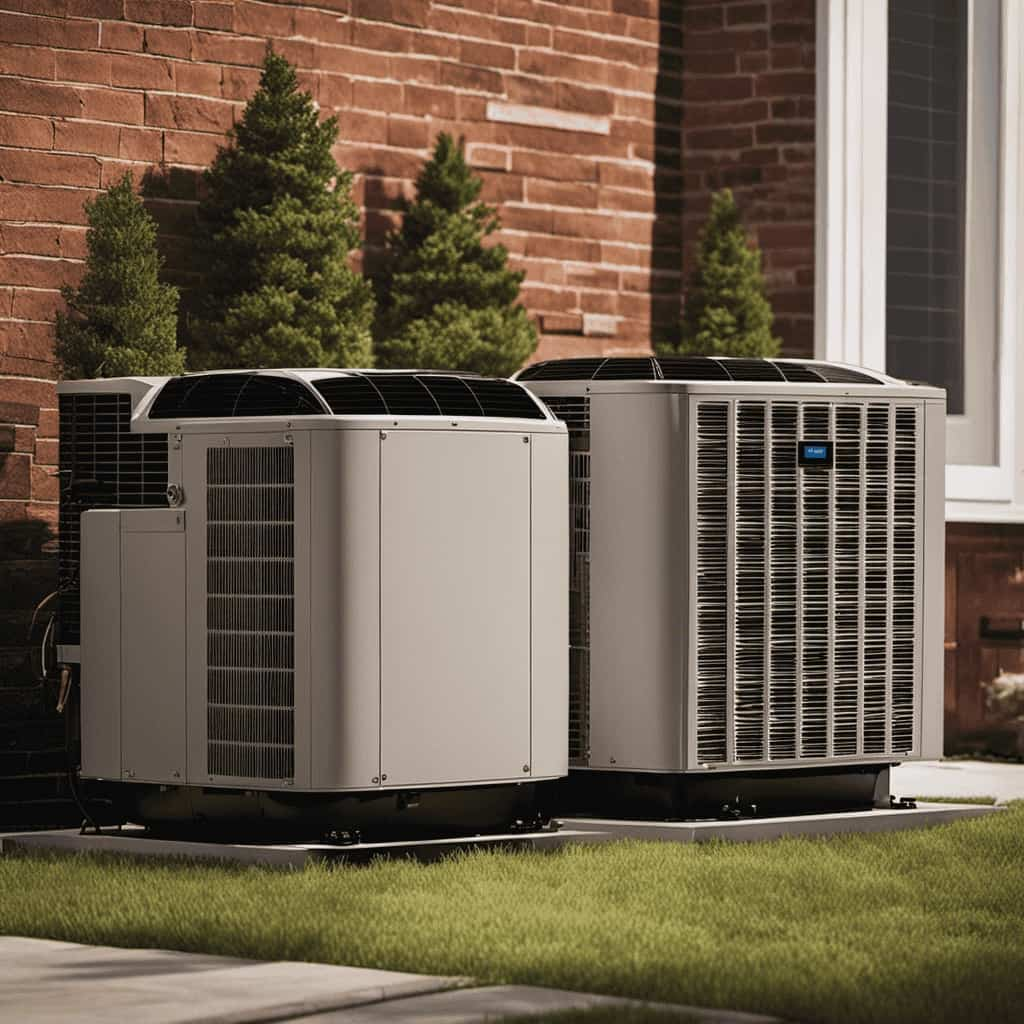
We are excited to announce the newest advancements in high-efficiency HVAC systems.
Picture this: heat pumps that revolutionize energy efficiency, like a cool breeze on a scorching summer day.
In this article, we will delve into the world of heat pump technology, uncovering the key factors that contribute to their efficiency.
Stay tuned as we explore the cutting-edge innovations that make upgrading to a high-efficiency HVAC system a game-changer for your home.
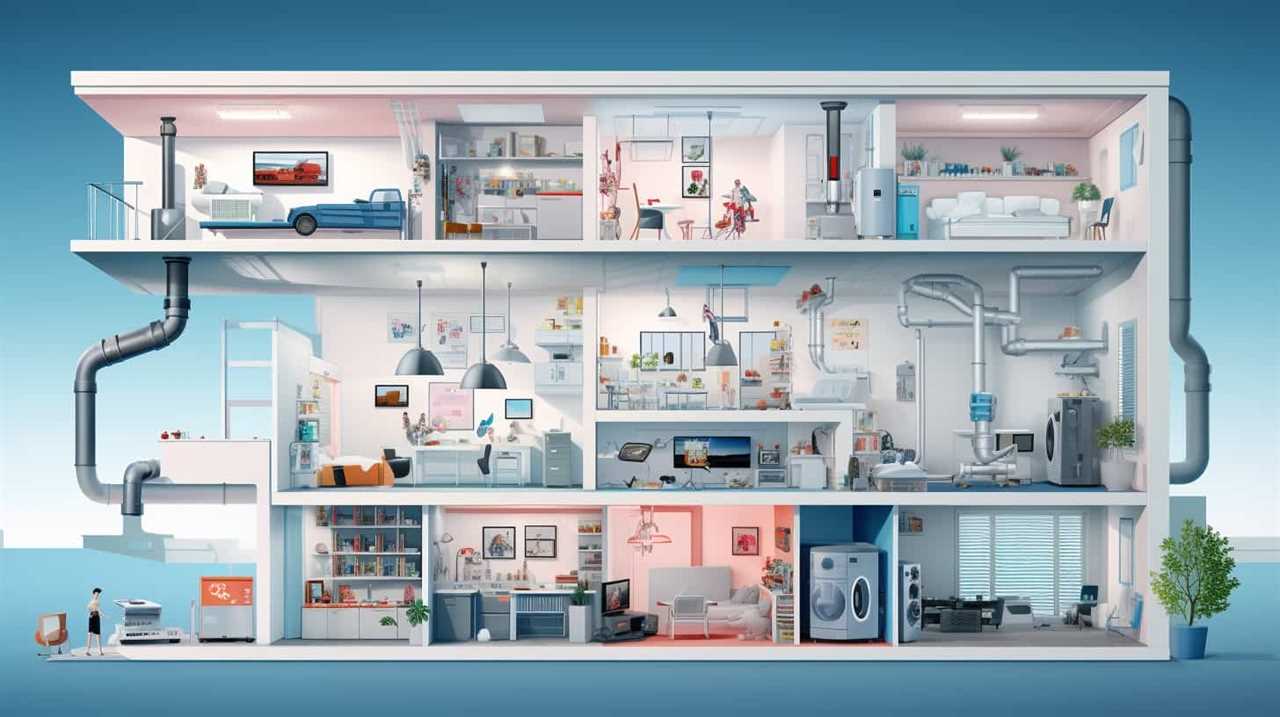
Get ready to liberate your energy consumption!
Key Takeaways
- High-efficiency HVAC systems optimize energy usage and provide superior comfort.
- Regular maintenance, such as cleaning air filters and inspecting ductwork, ensures optimal performance.
- Upgrading to a high-efficiency HVAC system provides optimal comfort while reducing energy consumption and costs.
- The integration of advanced technologies in high-efficiency HVAC systems enhances overall performance and user experience.
Overview of High-Efficiency HVAC Systems
As we delve into the topic of high-efficiency HVAC systems, let’s start by providing an overview of these innovative heating, ventilation, and air conditioning systems.
High-efficiency HVAC systems are designed to optimize energy usage and provide superior comfort in residential and commercial spaces.
One key aspect of maintaining these systems is regular HVAC system maintenance. This includes cleaning or replacing air filters, checking and sealing ductwork, and inspecting and cleaning the outdoor unit.

By properly maintaining your HVAC system, you can ensure its optimal performance and longevity.
Additionally, implementing energy-saving tips can further enhance the efficiency of these systems. Simple steps such as adjusting the thermostat, sealing air leaks, and using ceiling fans can significantly reduce energy consumption and lower utility bills.
Understanding Heat Pump Technology
Let’s dive into the inner workings of heat pump technology and understand how it functions to efficiently heat and cool your space.
Heat pump operation relies on two essential heat transfer mechanisms:
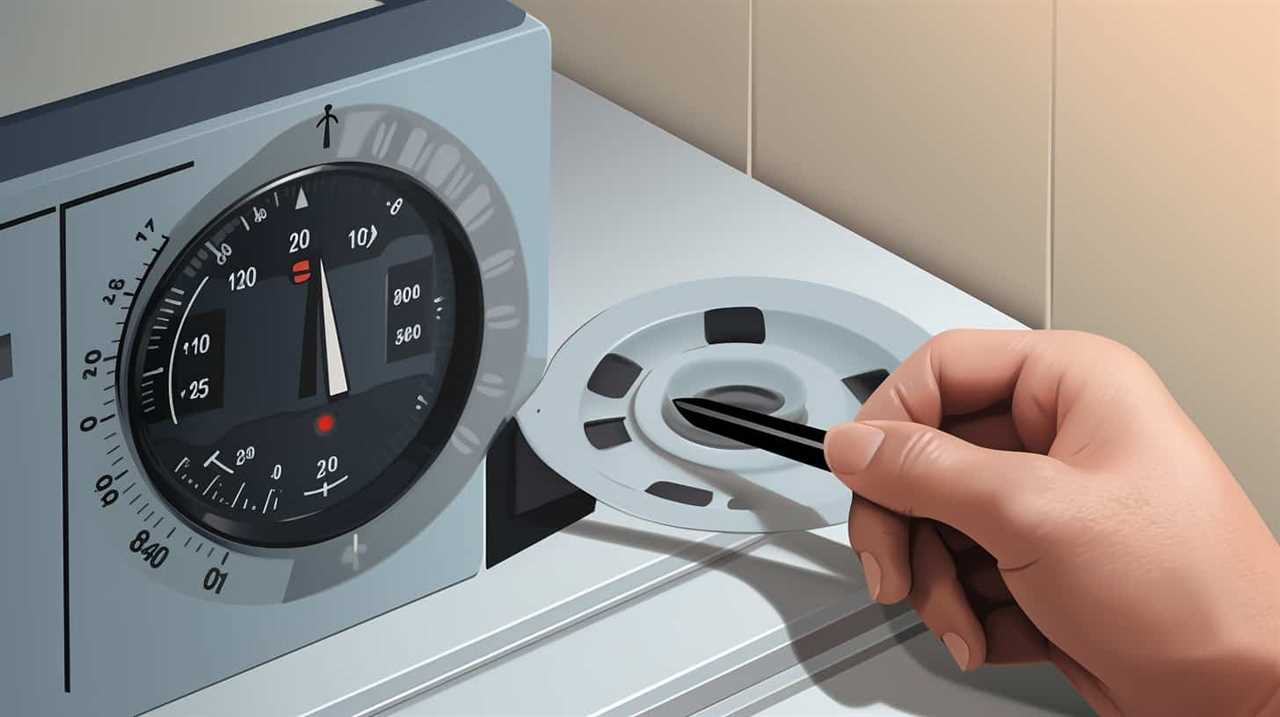
-
Refrigerant: Heat pumps utilize a refrigerant, a substance that can change from a gas to a liquid and vice versa at low temperatures. This refrigerant is responsible for absorbing and releasing heat energy throughout the system.
-
Evaporation and Condensation: The refrigerant evaporates at a low temperature, absorbing heat from the surrounding air or ground. It then undergoes compression, raising its temperature and pressure. Next, it condenses, releasing the absorbed heat to the space being heated.
-
Reversing Valve: The heat pump can change the direction of refrigerant flow using a reversing valve, allowing it to switch between heating and cooling modes.
-
Compressor: The compressor is responsible for increasing the pressure and temperature of the refrigerant, ensuring efficient heat transfer.

-
Heat Exchanger: Heat pumps have two heat exchangers, one indoor and one outdoor. These devices facilitate the transfer of heat between the refrigerant and the air or ground.
Key Factors for Heat Pump Energy Efficiency
We can achieve optimal heat pump energy efficiency by considering key factors such as proper sizing, regular maintenance, and effective insulation.
Heat pump maintenance is crucial for ensuring its peak performance and longevity. Regularly cleaning or replacing air filters is a simple yet effective way to improve energy efficiency. Additionally, scheduling professional maintenance checks at least once a year can help identify and address any potential issues before they become major problems.
Another important factor is effective insulation. Properly insulating your home can prevent heat loss during winter and heat gain during summer, reducing the workload on your heat pump and saving energy.
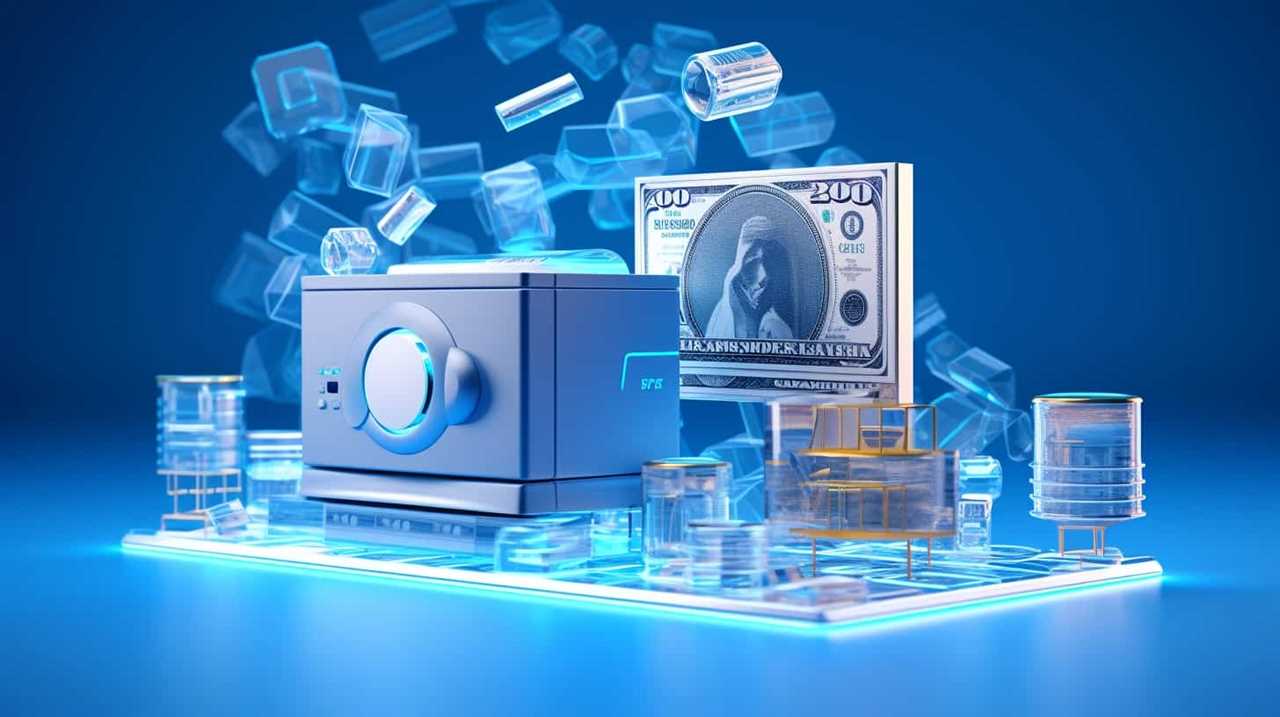
Latest Innovations in High-Efficiency Heat Pumps
Our research has uncovered several exciting breakthroughs in high-efficiency heat pumps that are revolutionizing the HVAC industry. These innovations are driving energy efficiency and providing greater comfort and control for consumers.
Here are five key advancements in high-efficiency heat pumps:
-
Advancements in heat pump compressors: New compressor designs, such as variable speed and scroll compressors, are improving the overall efficiency of heat pumps by allowing them to adjust their output based on the heating and cooling demands.
-
Integration of smart technology: High-efficiency heat pumps now come equipped with smart features that enable users to control and monitor their HVAC systems remotely. This integration allows for optimized energy usage and personalized comfort settings.

-
Enhanced refrigerant technology: The development of new refrigerants with lower global warming potential (GWP) has significantly reduced the environmental impact of high-efficiency heat pumps.
-
Improved defrosting capabilities: Heat pumps now have advanced defrosting algorithms that optimize defrost cycles, reducing energy waste and improving system performance in cold climates.
-
Enhanced system diagnostics: High-efficiency heat pumps are equipped with advanced diagnostic tools that can detect and troubleshoot system issues, allowing for faster and more accurate repairs.
These innovations in high-efficiency heat pumps are making HVAC systems more efficient, reliable, and user-friendly, leading to energy savings and improved comfort for consumers.
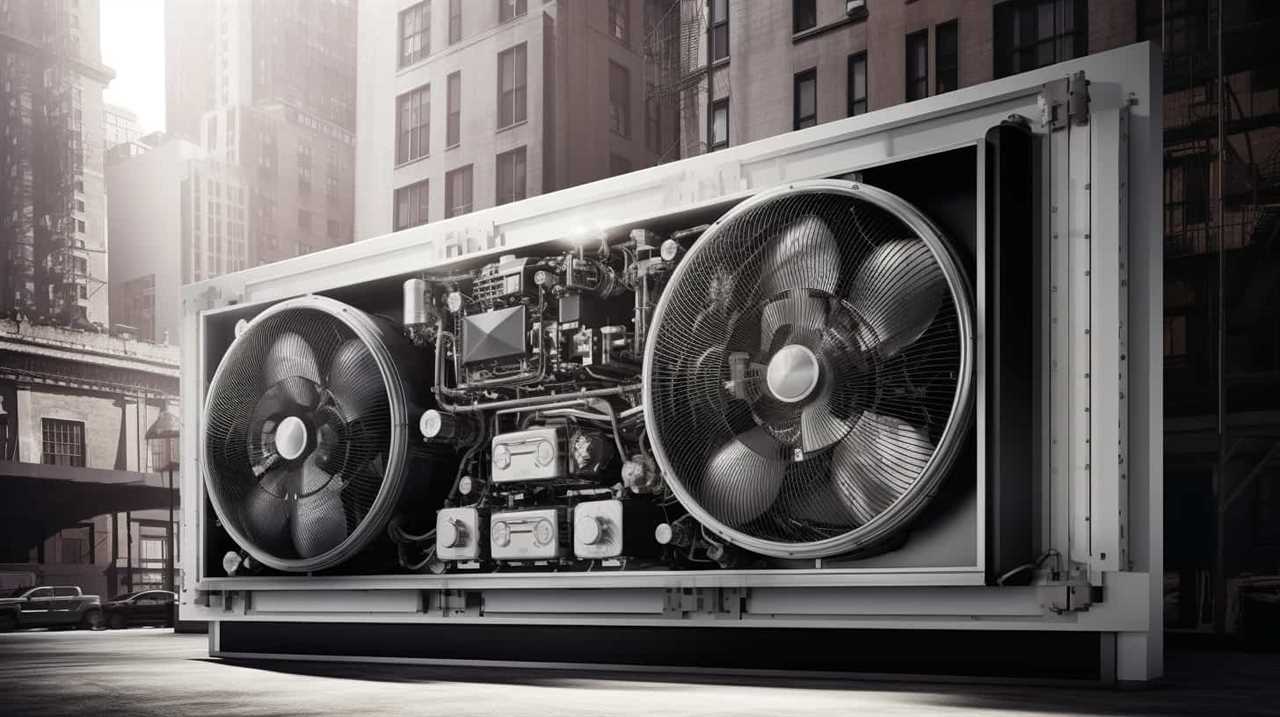
Benefits of Upgrading to a High-Efficiency HVAC System
Upgrading to a high-efficiency HVAC system offers homeowners significant energy savings and improved indoor comfort. These systems are designed to operate more efficiently, resulting in lower energy consumption and reduced utility bills. By utilizing advanced technologies such as variable-speed motors and smart thermostats, high-efficiency HVAC systems can adapt to the specific needs of a home, providing precise temperature control and optimal energy usage. The environmental impact of upgrading to a high-efficiency system should also be considered. These systems consume less energy, which reduces greenhouse gas emissions and helps conserve natural resources. Additionally, some high-efficiency HVAC systems use eco-friendly refrigerants that have a lower impact on the ozone layer. Overall, upgrading to a high-efficiency HVAC system not only benefits homeowners financially but also contributes to a greener and more sustainable future.
| Benefits | Energy Savings | Environmental Impact |
|---|---|---|
| Lower utility bills | Reduced energy consumption | Reduced greenhouse gas emissions |
| Improved comfort | Precise temperature control | Conservation of natural resources |
| Advanced technologies | Optimal energy usage | Use of eco-friendly refrigerants |
Frequently Asked Questions
Are High-Efficiency HVAC Systems More Expensive to Install Than Traditional Systems?
High efficiency HVAC system installation costs can be higher than traditional systems initially, but in the long run, they can save money due to lower energy consumption. Additionally, high efficiency systems tend to have a longer lifespan.
Can a High-Efficiency Heat Pump Be Used in Both Heating and Cooling Modes?
Yes, a high-efficiency heat pump can be used in both heating and cooling modes. It offers energy efficiency benefits and reduces the environmental impact. This breakthrough technology is a game-changer for HVAC systems.
How Long Does It Typically Take for a High-Efficiency HVAC System to Pay for Itself Through Energy Savings?
Typically, the payback period for a high-efficiency HVAC system through energy savings varies. It depends on factors such as the initial cost, energy prices, and usage patterns. However, over time, these systems can help recoup their cost through lower energy bills.
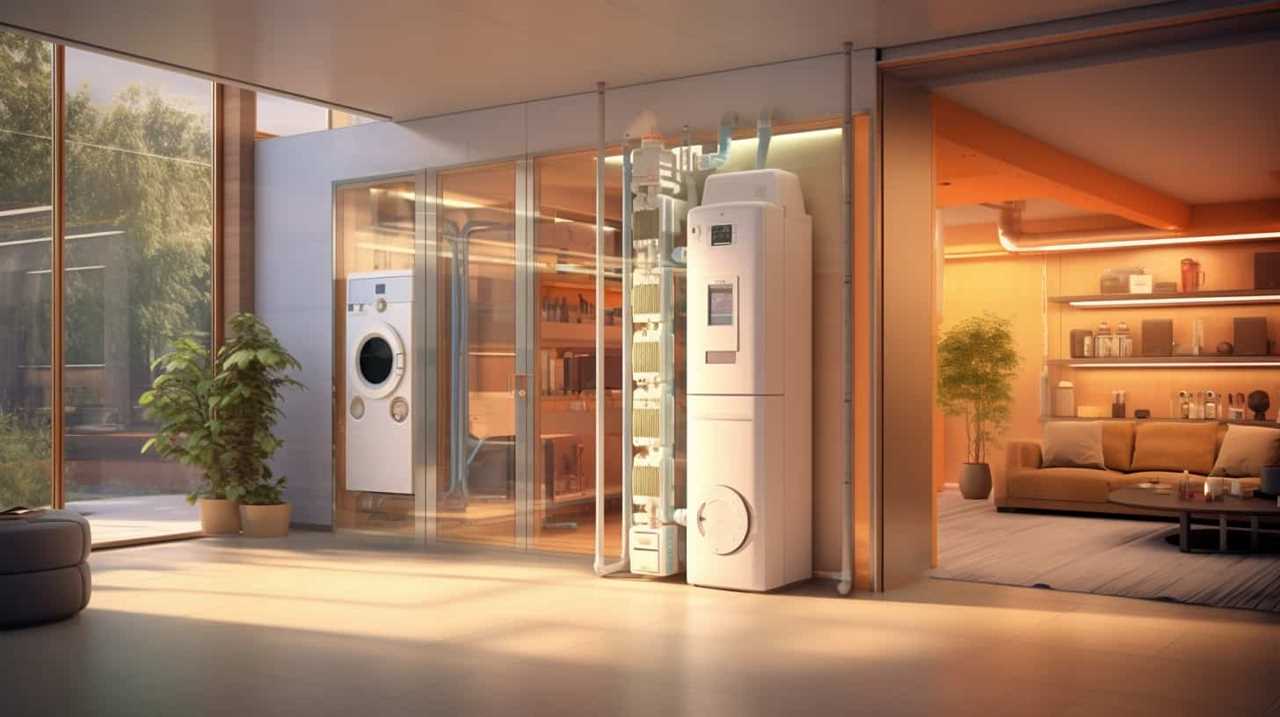
Are There Any Government Incentives or Tax Credits Available for Upgrading to a High-Efficiency HVAC System?
Yes, there are government incentives and tax credits available for upgrading to a high-efficiency HVAC system. These incentives and credits can help offset the cost of installation and make the upgrade more affordable.
Can a High-Efficiency Heat Pump Be Used in Conjunction With a Traditional Furnace for Backup Heating During Extremely Cold Temperatures?
Yes, a high-efficiency heat pump can be used in conjunction with a traditional furnace for backup heating during extremely cold temperatures. This provides the advantages of geothermal heating and the reliability of a traditional furnace.
Conclusion
In conclusion, upgrading to a high-efficiency HVAC system with the latest innovations in heat pump technology can greatly improve energy efficiency and reduce utility costs. These breakthroughs in heat pump technology allow for better heat transfer and more precise temperature control, resulting in optimal comfort and savings.
So, why not take the leap and embrace the new era of high-efficiency HVAC systems? It’s time to reap the benefits and make your home a haven of efficiency and comfort. After all, ‘out with the old, in with the new’!

Refrigeration Cycle
3 Key Comparisons: Heat Pumps Vs Traditional Heating

Welcome, ladies and gentlemen, to our evaluation comparing heat pumps with traditional heating systems.
Today, we embark on a journey where facts will illuminate the path towards informed decision making. Join us as we delve into the realm of energy efficiency, cost effectiveness, and environmental impact.
With these key comparisons, we aim to shed light on the benefits and drawbacks of each option, empowering you to make a choice that aligns with your values and desires for a greener future.
Let’s begin.
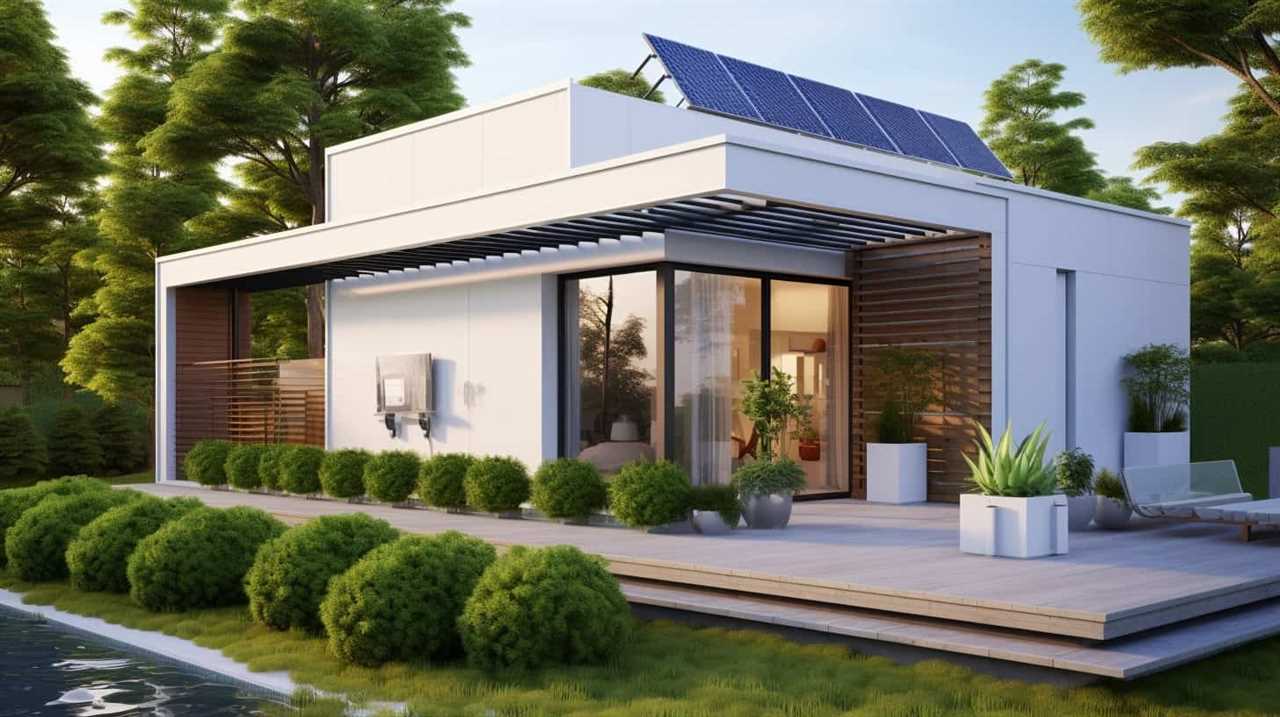
Key Takeaways
- Heat pumps are more energy efficient than traditional heating systems.
- Heat pumps reduce carbon emissions and contribute to a greener future.
- Heat pumps provide efficient and effective heating and cooling solutions.
- Heat pumps can be powered by renewable energy sources.
Energy Efficiency Comparison
When comparing heat pumps to traditional heating systems, we find that heat pumps are more energy efficient. Heat pump technology utilizes the principles of refrigeration to transfer heat from one space to another.
Unlike traditional heating systems that generate heat by burning fuel, heat pumps extract heat from the air, ground, or water sources, making them more energy efficient. This energy efficiency leads to significant energy savings for homeowners and businesses.
Heat pumps can provide up to four times the amount of energy they consume, resulting in lower energy bills and reduced carbon emissions. By harnessing the natural heat available in the environment, heat pump technology offers a sustainable and cost-effective solution for heating and cooling needs.
Cost Comparison
In terms of cost, heat pumps offer a more budget-friendly option compared to traditional heating systems. One of the main advantages of heat pumps is their long-term savings potential. While the initial installation cost of a heat pump may be higher than that of a traditional heating system, the energy savings over time can offset this initial investment.

Heat pumps are highly energy efficient, as they transfer heat rather than generate it, resulting in lower energy consumption and reduced utility bills. Additionally, heat pumps require less maintenance compared to traditional heating systems, resulting in lower maintenance expenses over time. This further contributes to the cost-effectiveness of heat pumps.
Environmental Impact Comparison
Using heat pumps instead of traditional heating systems can significantly reduce our environmental impact while still providing efficient and effective heating.
The environmental benefits of heat pumps are evident when considering carbon footprint analysis and the integration of renewable energy.
-
Carbon footprint analysis:

-
Heat pumps utilize electricity to transfer heat, resulting in lower carbon emissions compared to fossil fuel-based heating systems.
-
Traditional heating systems, such as gas or oil furnaces, release greenhouse gases that contribute to climate change.
-
By choosing heat pumps, we can reduce our carbon footprint and help mitigate the effects of global warming.
-
Renewable energy integration:

-
Heat pumps can be powered by renewable energy sources like solar or wind power.
-
This integration promotes the use of clean and sustainable energy, reducing our reliance on fossil fuels.
-
By harnessing renewable energy for heat pumps, we can further minimize our environmental impact and contribute to a greener future.
Frequently Asked Questions
How Does the Installation Process of a Heat Pump Compare to That of a Traditional Heating System?
The installation process of a heat pump compared to that of a traditional heating system is more complex and requires professional expertise. However, once installed, heat pumps have lower maintenance requirements and provide greater energy efficiency.

Are There Any Specific Maintenance Requirements for Heat Pumps That Differ From Traditional Heating Systems?
When it comes to maintenance requirements, heat pumps differ from traditional heating systems. While the installation process may be similar, heat pumps require regular cleaning of filters and coils, as well as periodic inspections for optimal performance.
Can a Heat Pump Be Used in Conjunction With a Traditional Heating System to Maximize Efficiency?
Yes, a heat pump can be used in conjunction with a traditional heating system to maximize efficiency. By utilizing the heat pump’s efficiency and the traditional system’s capabilities, we can achieve optimal heating performance.
What Are the Noise Levels Typically Associated With Heat Pumps Compared to Traditional Heating Systems?
What are the noise levels typically associated with heat pumps compared to traditional heating systems? Are heat pumps quieter? Noise levels vary, but heat pumps generally operate at lower decibel levels, making them a quieter option for energy-efficient heating.
Are There Any Government Incentives or Tax Credits Available for Installing a Heat Pump Versus a Traditional Heating System?
There are government incentives and tax credits available for installing a heat pump compared to a traditional heating system. These incentives can help offset the cost and make it more affordable for homeowners.
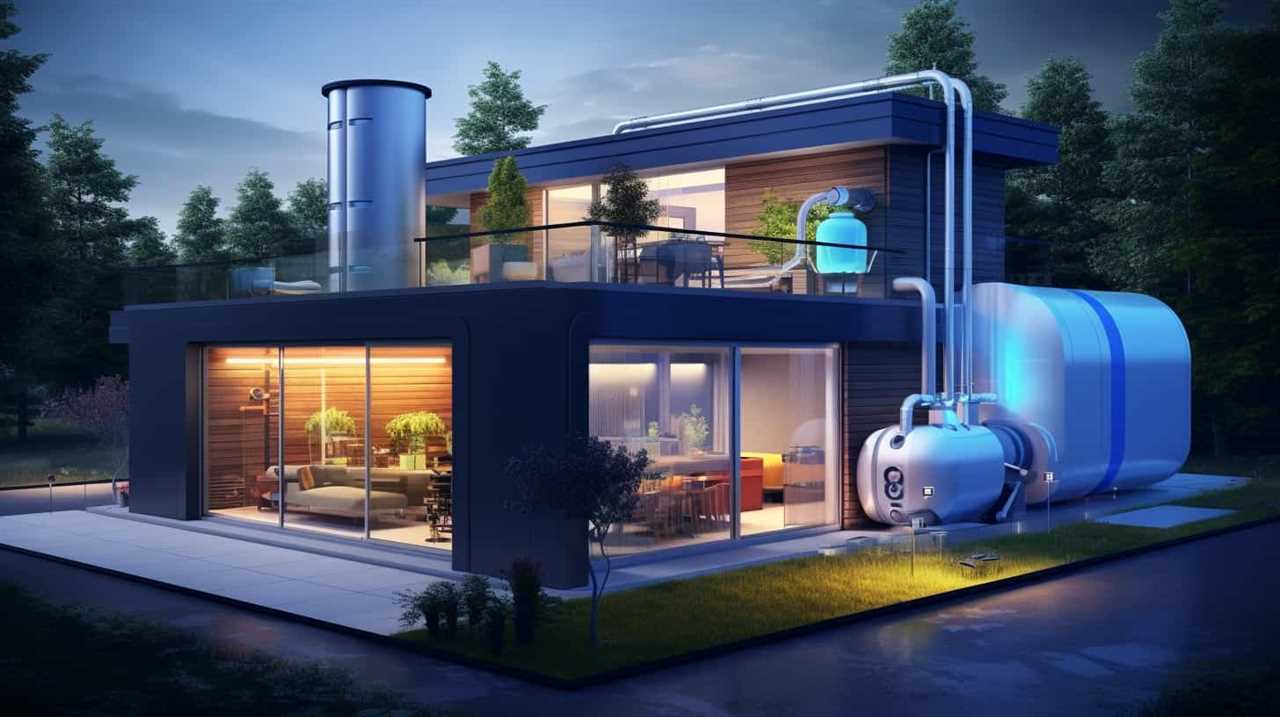
Conclusion
Overall, when comparing heat pumps to traditional heating methods, it’s clear that heat pumps offer significant advantages.
With their higher energy efficiency, cost-effectiveness, and minimal environmental impact, heat pumps paint a picture of a greener and more sustainable future.
By harnessing the power of technology, we can transition away from outdated and inefficient heating systems, symbolizing a shift towards a cleaner and more efficient way of living.
Refrigeration Cycle
Boosting ROI: Energy-Efficient Heat Pumps Expense Analysis

Ladies and gentlemen, get ready as we explore the realm of energy-saving heat pumps and how they affect return on investment (ROI).
In this article, we’ll explore the factors that affect the cost-benefit analysis of heat pump efficiency and analyze the initial expenses involved.
But wait, there’s more! We’ll also calculate the long-term savings these pumps offer and reveal how to maximize ROI through upgrades.
Get ready to revolutionize your energy usage and boost your bottom line!
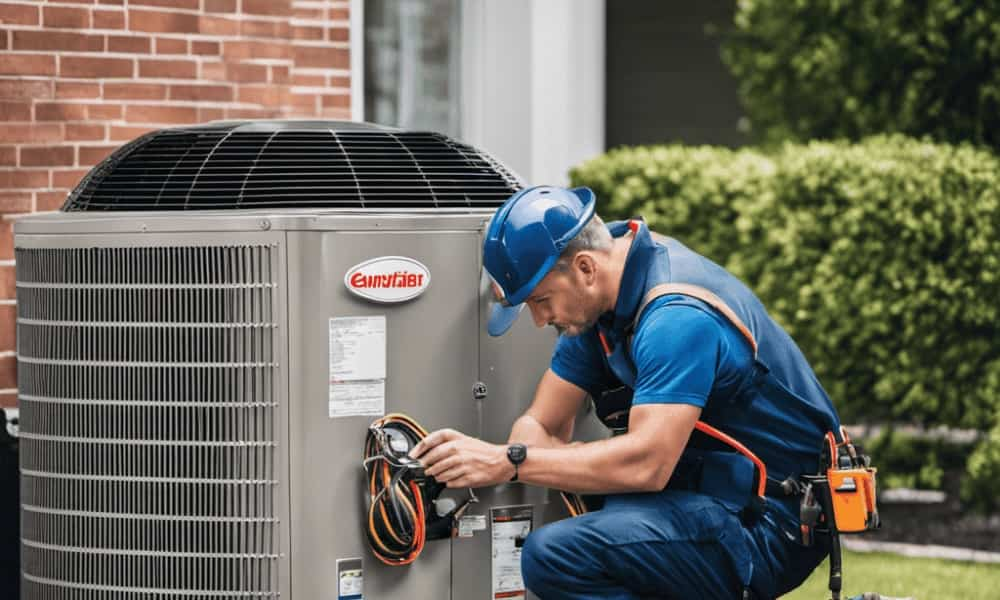
Key Takeaways
- ROI is crucial in determining the value of energy-efficient heat pumps.
- Factors such as energy prices and environmental impact should be considered in the cost-benefit analysis.
- Upfront expenses, maintenance costs, and incentives should be factored in when analyzing the initial expenses.
- Energy-efficient heat pumps can lead to long-term savings through reduced energy consumption and lower utility bills.
The Importance of ROI in Energy-Efficient Heat Pumps
We believe that ROI plays a crucial role in determining the value of energy-efficient heat pumps. For businesses and homeowners alike, it’s essential to consider the financial return on investment when deciding to adopt these innovative solutions.
The importance of ROI becomes even more evident when considering the impact on the environment. Energy-efficient heat pumps not only reduce energy consumption and utility costs but also significantly lower carbon footprint.
This is where government incentives come into play. By providing financial support and incentives for the adoption of energy-efficient heat pumps, governments can encourage individuals and organizations to invest in these environmentally friendly technologies. This not only benefits the environment but also helps businesses and homeowners save money in the long run.
Therefore, understanding the importance of ROI in energy-efficient heat pumps is crucial for making informed decisions and driving innovation in sustainable energy solutions.

Factors Affecting the Cost-Benefit Analysis of Heat Pump Efficiency
When evaluating the cost-benefit analysis of heat pump efficiency, it’s important to consider various factors that can impact the overall financial return on investment. Two key factors that must be taken into account are energy prices and the environmental impact of the heat pump system.
Energy prices play a significant role in determining the cost savings associated with heat pump efficiency. Higher energy prices can result in greater cost savings over time, as the energy-efficient heat pump consumes less electricity compared to traditional heating and cooling systems. On the other hand, lower energy prices may reduce the financial benefits of investing in a heat pump.
Furthermore, the environmental impact of the heat pump system is another important consideration. Heat pumps are known for their lower carbon emissions compared to conventional heating and cooling systems. By reducing reliance on fossil fuels, heat pumps contribute to a greener and more sustainable future. This environmental benefit must be factored into the cost-benefit analysis, as it adds value to the overall return on investment.
Analyzing the Initial Expenses of Energy-Efficient Heat Pumps
To accurately assess the financial viability of energy-efficient heat pumps, it’s essential to analyze the initial expenses involved and their impact on the return on investment. When conducting a cost analysis of energy-efficient heat pumps, the following factors should be considered:

-
Initial Investment: The upfront cost of purchasing and installing an energy-efficient heat pump is a significant expense. It includes the cost of the unit itself, any necessary modifications to the existing HVAC system, and professional installation fees.
-
Energy Savings: Energy-efficient heat pumps consume less electricity compared to traditional heating systems. By quantifying the potential energy savings over the lifespan of the heat pump, the long-term financial benefits can be determined.
-
Maintenance and Repair Costs: It’s important to factor in the ongoing maintenance and repair costs associated with energy-efficient heat pumps. Regular maintenance and occasional repairs are necessary to ensure optimal performance and longevity.
-
Incentives and Rebates: Various government incentives and utility company rebates may be available to offset the initial investment. These incentives can significantly reduce the overall cost and improve the return on investment.

Calculating Long-Term Savings With Energy-Efficient Heat Pumps
Our analysis aims to determine the long-term savings achieved by utilizing energy-efficient heat pumps. When considering the cost of implementing energy-efficient heat pumps, it’s essential to assess the long-term benefits and energy savings that can be achieved.
Energy-efficient heat pumps have the potential to significantly reduce energy consumption and lower utility bills. By utilizing advanced technology and innovative designs, these heat pumps can provide efficient heating and cooling solutions while minimizing energy wastage.
The long-term benefits of energy-efficient heat pumps include reduced energy costs, improved energy efficiency, and decreased environmental impact. These factors contribute to substantial savings over time, making energy-efficient heat pumps a wise investment for both residential and commercial applications.
Maximizing ROI Through Energy-Efficient Heat Pump Upgrades
The key to maximizing our ROI through energy-efficient heat pump upgrades lies in carefully selecting the most cost-effective and technologically advanced options available. By improving efficiency and taking advantage of financial benefits, we can significantly increase our returns on investment.

Here are four strategies to consider when upgrading heat pumps:
-
Conduct a thorough energy audit: Before making any upgrades, assess the current energy usage and identify areas for improvement. This will help determine the most effective upgrades to maximize ROI.
-
Choose high-efficiency heat pumps: Look for heat pumps that have a high SEER (Seasonal Energy Efficiency Ratio) rating and HSPF (Heating Seasonal Performance Factor) rating. These ratings indicate the energy efficiency of the heat pump and can greatly impact energy savings.
-
Consider variable-speed technology: Heat pumps with variable-speed compressors adjust their output based on the heating or cooling needs, resulting in more efficient operation and reduced energy consumption.
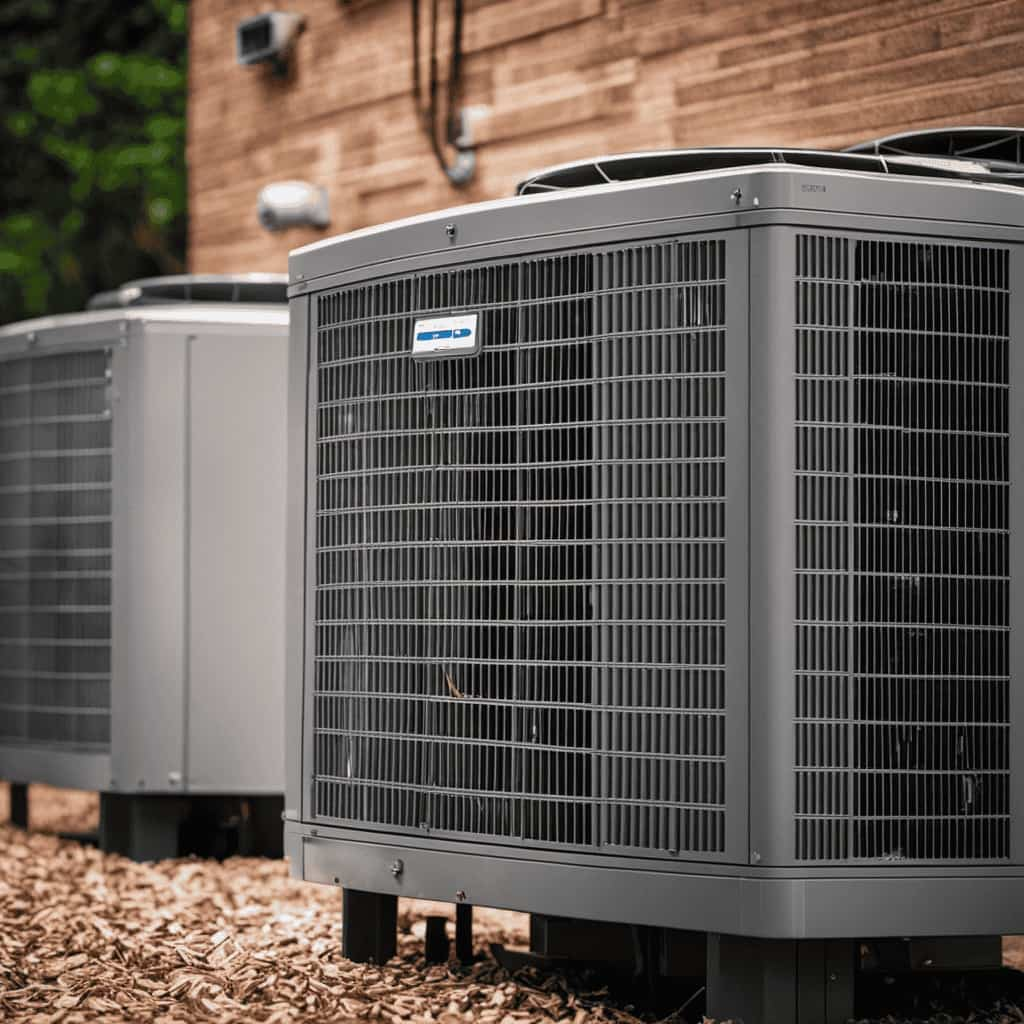
-
Explore financing options: Research available incentives, rebates, and financing programs to offset the initial cost of the upgrades. This can help improve the ROI and make the investment more financially feasible.
Frequently Asked Questions
How Do Heat Pumps Compare to Other Heating and Cooling Systems in Terms of Energy Efficiency?
Heat pumps offer higher energy efficiency compared to other heating and cooling systems. A comparative analysis reveals their lower environmental impact. This innovation provides a technical and analytical solution for boosting ROI and reducing energy expenses.
What Are the Key Factors to Consider When Analyzing the Long-Term Savings of Energy-Efficient Heat Pumps?
When analyzing the long-term savings of energy-efficient heat pumps, key factors to consider include energy savings and maintenance costs. By examining these factors, we can determine the overall return on investment for this innovative technology.
Are There Any Government Incentives or Rebates Available for Installing Energy-Efficient Heat Pumps?
Yes, there are government incentives and rebates available for installing energy-efficient heat pumps. These incentives aim to promote energy savings and make the adoption of such technology more financially feasible for consumers.

How Does the Climate or Geographical Location Affect the Cost-Benefit Analysis of Heat Pump Efficiency?
The climate and geographical location have a significant impact on the cost-benefit analysis of heat pump efficiency. Understanding these factors is crucial when evaluating the potential ROI and determining the most suitable energy-efficient heat pump system.
What Are Some Common Upgrades or Improvements That Can Be Made to Existing Heat Pump Systems to Maximize Roi?
Improving performance and maximizing ROI for existing heat pump systems can be achieved through various retrofit options. Upgrades such as variable speed drives, enhanced controls, and improved insulation can significantly enhance efficiency and reduce operating costs.
Conclusion
In conclusion, by considering the importance of ROI in energy-efficient heat pumps and analyzing the initial expenses as well as long-term savings, it’s evident that maximizing ROI through upgrades is crucial.
Factors affecting the cost-benefit analysis of heat pump efficiency should be taken into account to make informed decisions.

By implementing energy-efficient heat pumps, individuals can enjoy the benefits of reduced energy consumption and increased cost savings.
-

 Residential and Commercial Applications2 weeks ago
Residential and Commercial Applications2 weeks agoBest Amana Heat Pump Reviews
-

 Thermal Energy Transfer2 weeks ago
Thermal Energy Transfer2 weeks agoBreakthroughs in Modern Heat Pump Systems: Thermal Energy Edition
-

 Residential and Commercial Applications2 weeks ago
Residential and Commercial Applications2 weeks agoBest Heat Pump
-

 Geothermal Heat Pumps3 months ago
Geothermal Heat Pumps3 months agoUpgrade Your Comfort with Our Efficient HVAC Systems
-

 Air Conditioning3 months ago
Air Conditioning3 months agoExploring Energy-Efficient Air Conditioning Heat Pumps
-

 Geothermal Heat Pumps3 months ago
Geothermal Heat Pumps3 months agoInnovative Geothermal Heat Pump Manufacturers Revolutionize Energy Efficiency
-

 Thermal Energy Transfer1 month ago
Thermal Energy Transfer1 month agoBoost Your Heat Pump Efficiency: Interactive Guide
-

 Residential and Commercial Applications2 weeks ago
Residential and Commercial Applications2 weeks agoBest Portable Heat Pump Heat & AC










